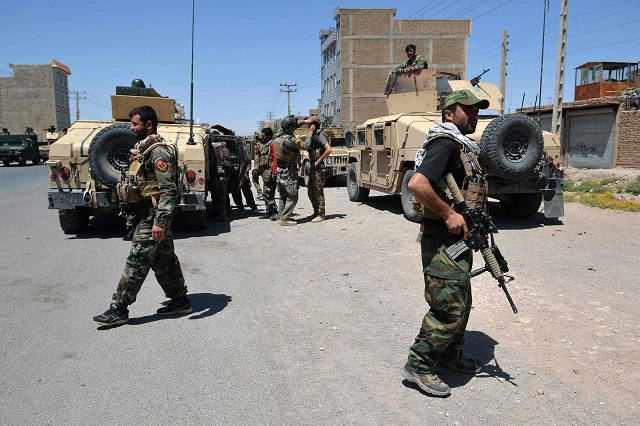
Why poorly armed Taliban triumphed over the US military after two decades of war
THE LAST WORD | ANDREW M. MWENDA | The rapid collapse of the Afghanistan government before a rag tag army of (apparently) “poorly trained, poorly armed, poorly resourced and poorly commanded Taliban” (or so the lords of global wisdom judged), marks the defeat of one of the most disastrous experiments in international relations – liberal imperialism!
By liberal imperialism I mean attempts by the West to remodel other nations and societies in its own image i.e. liberal. The West tries this through diplomatic pressure (hectoring and threatening), economic blackmail (cutting aid) and in some radical cases (such as Libya, Iraq, Afghanistan etc) through the barrel of the gun.
Liberal imperialism is a mutilation of the original (or classical) liberal idea, which I think is an inspiring and powerful idea. Classical liberalism believes that human beings have different views and values; therefore we cannot agree even on basic principles. The best way to live together is to respect and tolerate diversity.
Domestically classical liberalism allowed a diversity of views and beliefs i.e. it was particularistic. At the international level, classical liberalism believes every society should have the form of government it’s people choose. The Atlantic Charter which was issued by U.S. President F.D. Roosevelt and UK Prime Minister Winston Churchill in 1941 affirmed this principle.
Therefore, classical liberalism does not have the missionary creed to spread itself as a universal value to every part of the world precisely because it was based on the principle of tolerance of diversity.
Liberal imperialism, on the other hand, is universalist. It believes that liberalism must be spread around the globe to every society like a religion; that every nation regardless of circumstances, should become liberal or face sanctions or even war. It is, therefore, intolerant of diversity. It seeks to promote uniformity.
It is the desire to spread it internationally that makes liberal imperialism an intolerant creed. It sees every government that is not liberal democratic as dictatorial and cruel. In this way, liberal imperialism is not any different from the very Islamic fundamentalism/extremist which considers every non-Muslim to be an infidel.
Because of this intolerance, liberal imperialism has faced acute resistance everywhere. This is the reason it has faced disaster after disaster in the last 30 years wherever it has been tried – most especially and explicitly in Libya, Iraq and Afghanistan. Why? Because its international match seeking to impose itself on other society confronts an even more powerful ideology, nationalism.
This is the reason for the failure of America in Afghanistan. America’s liberal project has been defeated by the forces of nationalism. The major source of this failure is not that the U.S. intervened and removed the Taliban and occupied the country. The occupation was derivative. The primary problem is that America sought to reshape Afghanistan in its own image i.e. make it a liberal democracy.
Although America’s aim in Afghanistan was to fight terrorism, the occupation was driven by the belief that to make that country inhospitable for terrorism requires a broad nation building project by turning it into a liberal democracy. It is this attempt to reshape Afghan society into a mirror image of America that led to disaster.
Many Americans believe that legitimate government is one where leaders are elected through free and fair competitive elections; there is separation of powers between different arms of government (the executive, judiciary and legislature), there are checks and balances, a free press and where the government delivers public goods and services to all citizens through impersonal institutions.
But this is a western conception of governmental legitimacy. To believe that an ordinary Pashtun peasant in a village in Afghanistan holds such a belief is delusional. This belief has evolved in the west over centuries of structural change and political struggle. A few elites in Kabul, educated in western philosophy, may hold these beliefs and espouse such ideas but only artificially. For most Afghans, the source of legitimacy are based on their inherited traditions and values, not western conceptions.
The American supported government in Kabul was seen by many afghans for what it really was – a puppet administration. Here liberalism collided with nationalism and nationalism won. There was also a religious dimension to this: Americans were seen as infidels in this deeply religious Muslim society. Attempts to promote gender rights and other associated changes in Afghan society were seen as external impositions, however morally appealing they may appear in the eyes and minds of western educated elites.
This is the context in which America has been defeated and humiliated. By 2010, America had 100,000 troops, its NATO allies about 36,000 in Afghanistan. They financed a government that was elected democratically, provided public goods and services and promoted a regime of political and social rights on the lines of Denmark.
They also trained, armed and equipped 300,000 Afghanistan national army troops. The cost of this was $85 billion. Yet this phalanx of steel with the most advanced attack planes, drones, helicopters, artillery and mortars could not match the Taliban of not more 75,000 poorly trained and equipped and not paid insurgents. Why?
The belief that elections bring legitimacy under all circumstances is misguided. For as long as the government in Kabul was foreign sponsored, promoting foreign ideas and creeds, it was bound never to find support among ordinary Afghans. Elections as a form of legitimacy is new in the world and largely Western. For millennia, human beings have lived under governments that were not democratically elected but were seen as legitimate.
To understand this, we need to ask who is a typical Taliban that defeated America? He is a vendor in the street, a farmer in a garden, a trader in a market, a businessman in a shop, a civil servant in a government ministry, a priest in a mosque, a teacher in a school, a nurse in a hospital, a tribal chief in a village, a waiter in a restaurant, a policeman on guard, and yes, a soldier in the Afghanistan national army. To fight the Taliban was to fight Afghan society; and in that fight America had no chance.
Finally the western mindset cannot overcome its false assumptions. For example many commentators are claiming that the Afghanistan government lacked legitimacy because it was corrupt. But there are many extremely corrupt governments around that world that have enjoyed long and stable careers – precisely because they were corrupt. In fact the most enduring “regimes” I know have been equally the most corrupt.
America’s imperial project in Afghanistan failed because it was essentially an attempt to turn Afghanistan into America. Afghans, a proud people, could not accept such mutilation of their identity.
****
amwenda@independent.co.ug
 The Independent Uganda: You get the Truth we Pay the Price
The Independent Uganda: You get the Truth we Pay the Price




And you had to smuggle in your pet talk- corruption
Andrew, I totally agree with you on this one.
Notwithstanding an interesting view, Andrew, your assertion that America was defeated by a peasant army is lopsided, misleading and overstretched. The Taliban did not defeat the US Army. The US Army decided to withdraw because it was not in their interest anymore to be in Afghanistan; a nation that Americans have absolutely little to almost no strategic or economic interest prior to Osama Bib Laden & after USSR left . The project in nation building was a failure however the initial mission to remove Al qaeda and other terrorists was successful. That the Afghan national army decided to run like cowards and not fight is nothing anyone could have done anything about.
American had been fighting this war for 20 years, with all the billions of dollars involved, they forgot one thing, you can not buy support, if it was to succeed, the whole agenda in the middle East could be on the same footing. You expect Afghans to support you when there colleagues are in Israel are under apartheid.